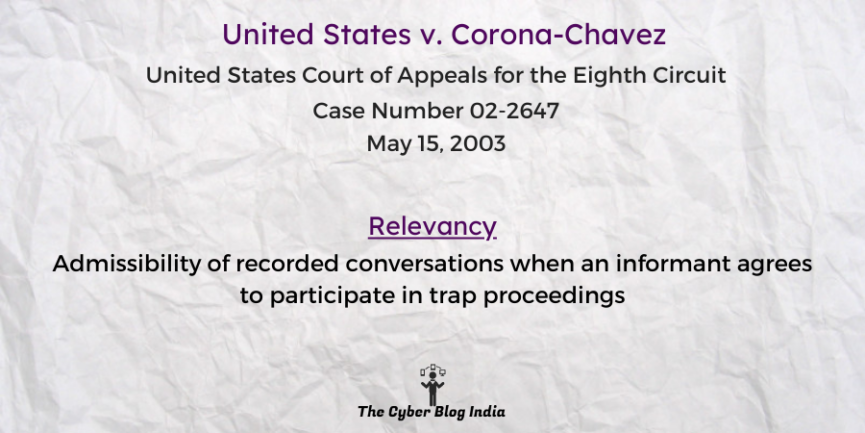United States v. Corona-Chavez

United States v. Corona-Chavez
328 F.3d 974
In the United States Court of Appeals for the Eighth Circuit
Case Number 02-2647
Before Circuit Judge Gibson, Circuit Judge Wollman and Circuit Judge Melloy
Decided on May 15, 2003
Relevancy of the case: Admissibility of recorded conversations when an informant agrees to participate in trap proceedings
Statutes and Provisions Involved
- The Federal Wiretapping Act, 18 U.S.C. §§ 2510-22
Relevant Facts of the Case
- Officers stopped Munoz, whose Ford Excursion had 19 bags of methamphetamine. She admitted consenting to participate in the drug delivery.
- The police hired two hotel rooms, placing Munoz in one room with a recording device and audio and video monitoring in the other. Police were present throughout, taping the exchange.
- Munoz requested Carlos to arrive at the hotel. Soon after his and the defendant’s arrival, she gave Gaytan a fake Ford key, which was used in the hotel’s parking lot.
- The Magistrate Judge concluded that the facts supported Munoz’s consent to tape the telephone conversation since he disclosed the planned transaction to police, agreed to assist in a controlled delivery, and gave them keys to the Excursion.
Prominent Arguments by the Counsels
- The appellee’s counsel argued that Munoz impliedly consented to be wired for sound by cooperating with the police. Further, anybody conversing knows that the other may reveal or record the conversation. Lastly, the defendant didn’t have a reasonable expectation of privacy in the hotel room.
- The appellant’s counsel submitted that covert video surveillance is more intrusive than direct observation. It is reasonable not to expect videotaping even in locations with no reasonable expectation of privacy.
Opinion of the Bench
- Videotaping the meeting in the hotel room did not infringe the defendant’s Fourth Amendment rights.
- The District Court correctly denied his motion to suppress the videotape.
Final Decision
- The court affirmed the conviction.
